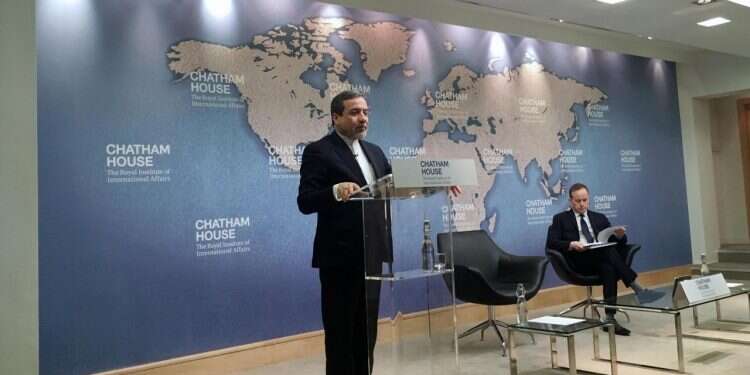Iran will withdraw from the 2015 nuclear deal if there is no economic benefit and major banks continue to shun the Islamic republic, Iranian Deputy Foreign Minister Abbas Araghchi said on Thursday.
Under the deal signed with Britain, China, France, Germany, Russia and the United States, Iran agreed to restrict its nuclear program in return for the removal of sanctions that have crippled its economy.
Despite that, big banks have continued to stay away for fear of falling foul of remaining U.S. sanctions – something that has hampered Iran's efforts to rebuild foreign trade and lure investment.
Adding to those concerns, U.S. President Donald Trump told the Europeans on Jan. 12 they must agree to "fix the terrible flaws of the Iran nuclear deal" or he would reimpose the sanctions lifted by the U.S. as part of the pact.
But even if Trump relents and issues fresh "waivers" to continue suspending those sanctions, the existing situation is unacceptable for Iran, Araghchi, Iran's lead nuclear negotiator, said in a speech at the Chatham House think tank in London.
"The deal would not survive this way even if the ultimatum is passed and waivers are extended," Araghchi said.
"If the same policy of confusion and uncertainties about the JCPOA [Joint Comprehensive Plan of Action, the nuclear deal] continues, if companies and banks are not working with Iran, we cannot remain in a deal that has no benefit for us. That's a fact."
Trump sees three defects in the deal: its failure to address Iran's ballistic missile program; the terms under which international inspectors can visit suspect Iranian nuclear sites; and "sunset" clauses under which limits on the Iranian nuclear program start to expire after 10 years.
He wants all three strengthened if the United States is to stay in the nuclear deal.
Araghchi said Trump's interpretation of the sunset clauses is wrong.
"There is no sunset clause in the JCPOA. Although the U.S. administration and Trump are talking about sunset clause and that JCPOA is just for 10 years, that is not true," he said.
"Iran's commitment in the JCPOA not to go for the nuclear weapons is permanent."
Araghchi also reiterated Iran's position that the JCPOA is a non-proliferation treaty and cannot be linked to any other issue.
If the nuclear deal is linked to Iran's ballistic missile program or its regional activities, world powers "not only will lose the JCPOA, but will make other issues more complicated and more difficult to resolve," he said.
"If we lose the JCPOA, we will face another nuclear crisis. For the Europeans or the world community, when we talk about maintaining the JCPOA and saving it, it's not a choice between the Iranian or the U.S. market, it's not a choice for economic cooperation; it's a choice between having security or insecurity."
Meanwhile, in an apparent diplomatic warning shot at Washington, Iran has also raised the prospect of building nuclear reactors for ships while staying within the limits of the nuclear deal, the International Atomic Energy Agency said in a report Thursday.
The latest quarterly report on Iran by the U.N. nuclear watchdog showed that Iran remained compliant with the nuclear deal, but also that it had informed the agency of a "decision that has been taken to construct naval nuclear propulsion in future."
Analysts have said Iran is many years or decades away from having a naval nuclear capacity. But mentioning it both projects military might and suggests potentially enriching uranium beyond the deal's limit of 3.67% purity.
Iran has raised that prospect in public statements before. In 2016, Iranian President Hassan Rouhani ordered the start of planning for the development of nuclear marine propulsion in reaction to what he called U.S. violations of the nuclear deal.
A senior diplomat said it was not clear from Iran's statement to the IAEA whether it was referring to those previous statements, but they appeared to be a reaction to Trump's comments.
"Formally there is no clarity on this. But informally yes, why now? So obviously there is a link ... to the possibility that the JCPOA's future is questioned," the diplomat said.
Iran's notification on marine propulsion could cover a range of intentions over any period, meaning there was no cause for concern, the diplomat said.
Iran has yet to respond to the IAEA's request for "further clarifications and amplifications," the report said. It added that if Iran has reached a concrete decision to build new facilities for marine propulsion, it must provide design information.




